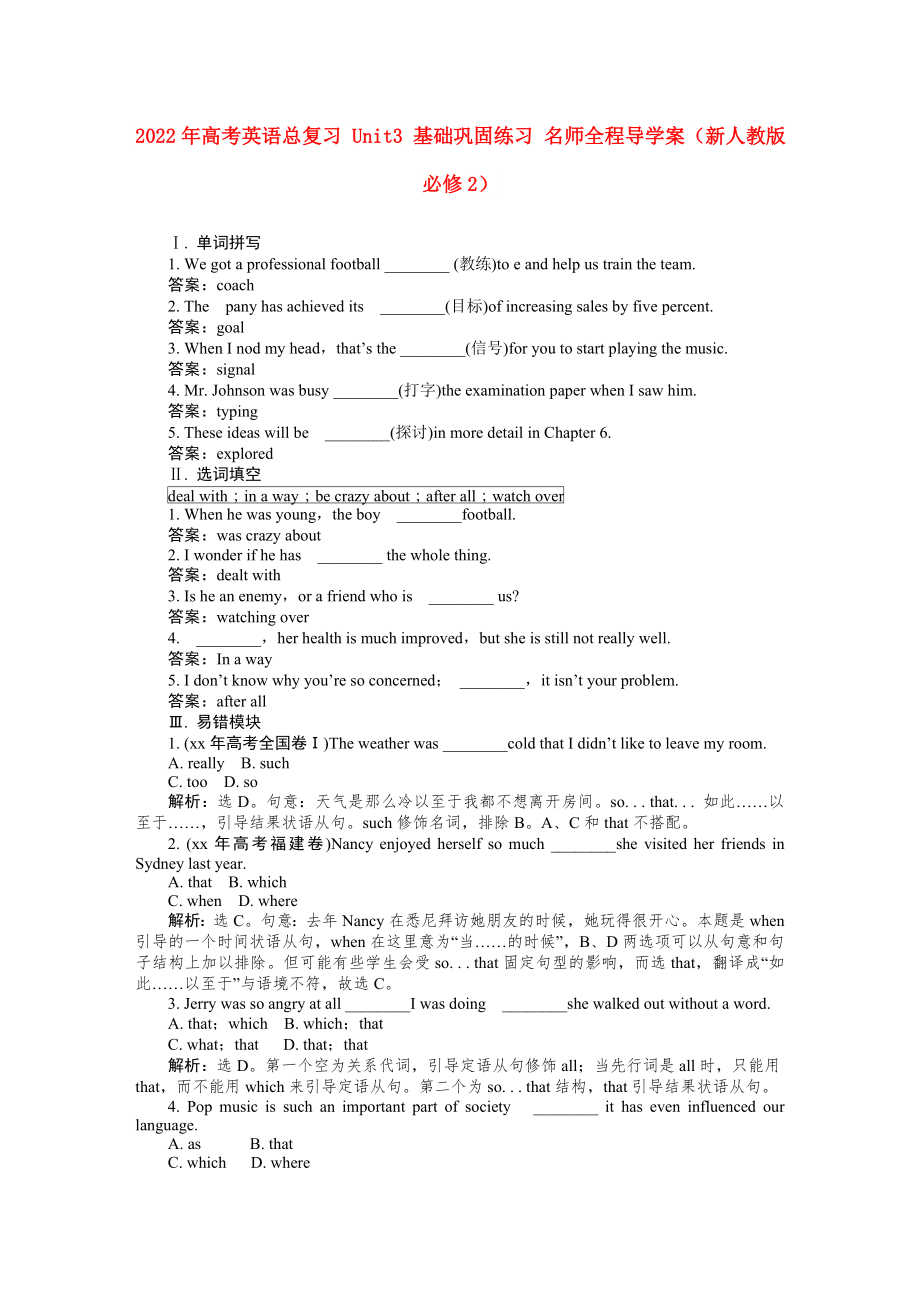《2022年高考英語(yǔ)總復(fù)習(xí) Unit3 基礎(chǔ)鞏固練習(xí) 名師全程導(dǎo)學(xué)案(新人教版必修2)》由會(huì)員分享,可在線閱讀����,更多相關(guān)《2022年高考英語(yǔ)總復(fù)習(xí) Unit3 基礎(chǔ)鞏固練習(xí) 名師全程導(dǎo)學(xué)案(新人教版必修2)(2頁(yè)珍藏版)》請(qǐng)?jiān)谘b配圖網(wǎng)上搜索���。
1��、2022年高考英語(yǔ)總復(fù)習(xí) Unit3 基礎(chǔ)鞏固練習(xí) 名師全程導(dǎo)學(xué)案(新人教版必修2)
Ⅰ. 單詞拼寫(xiě)
1. We got a professional football ________ (教練)to e and help us train the team.
答案:coach
2. The pany has achieved its ________(目標(biāo))of increasing sales by five percent.
答案:goal
3. When I nod my head��,that’s the ________(信號(hào))for you to start
2����、playing the music.
答案:signal
4. Mr. Johnson was busy ________(打字)the examination paper when I saw him.
答案:typing
5. These ideas will be ________(探討)in more detail in Chapter 6.
答案:explored
Ⅱ. 選詞填空
1. When he was young��,the boy ________football.
答案:was crazy about
2. I wonder if he ha
3���、s ________ the whole thing.
答案:dealt with
3. Is he an enemy���,or a friend who is ________ us?
答案:watching over
4. ________����,her health is much improved�,but she is still not really well.
答案:In a way
5. I don’t know why you’re so concerned; ________�,it isn’t your problem.
答案:after all
Ⅲ. 易
4、錯(cuò)模塊
1. (xx年高考全國(guó)卷Ⅰ)The weather was ________cold that I didn’t like to leave my room.
A. really B. such
C. too D. so
解析:選D�。句意:天氣是那么冷以至于我都不想離開(kāi)房間。so. . . that. . . 如此……以至于……����,引導(dǎo)結(jié)果狀語(yǔ)從句。such修飾名詞�,排除B。A��、C和that不搭配�����。
2. (xx年高考福建卷)Nancy enjoyed herself so much ________she visited her friends in Sydney la
5���、st year.
A. that B. which
C. when D. where
解析:選C�����。句意:去年Nancy在悉尼拜訪她朋友的時(shí)候���,她玩得很開(kāi)心�。本題是when引導(dǎo)的一個(gè)時(shí)間狀語(yǔ)從句���,when在這里意為“當(dāng)……的時(shí)候”��,B����、D兩選項(xiàng)可以從句意和句子結(jié)構(gòu)上加以排除�����。但可能有些學(xué)生會(huì)受so. . . that固定句型的影響�����,而選that��,翻譯成“如此……以至于”與語(yǔ)境不符�,故選C�。
3. Jerry was so angry at all ________I was doing ________she walked out without a word.
A. tha
6�、t��;which B. which�;that
C. what;that D. that�;that
解析:選D。第一個(gè)空為關(guān)系代詞����,引導(dǎo)定語(yǔ)從句修飾all;當(dāng)先行詞是all時(shí)��,只能用that�����,而不能用which來(lái)引導(dǎo)定語(yǔ)從句��。第二個(gè)為so. . . that結(jié)構(gòu)����,that引導(dǎo)結(jié)果狀語(yǔ)從句。
4. Pop music is such an important part of society ________ it has even influenced our language.
A. as B. that
C. which D. where
解析:選B����?��?疾閟u
7、ch. . . that“如此……以至于……”結(jié)構(gòu)�����。
5. (xx年黃岡質(zhì)量檢測(cè))Beijing was attacked by such a terrible sandstorm ________few residents had ever experienced before.
A. as B. which
C. and it was D. that
解析:選A��?��?疾槎ㄕZ(yǔ)從句����。as在此處為關(guān)系代詞����,作experienced的賓語(yǔ)����。
Ⅳ. 語(yǔ)法專練
本單元語(yǔ)法——現(xiàn)在完成時(shí)的被動(dòng)語(yǔ)態(tài)
1. —We want to sit at the table near t
8、he window.
—I’m sorry�����,but it ________ already.
A. has taken B. took
C. was taken D. has been taken
解析:選D。從題干中的答語(yǔ)知道����,座位已經(jīng)有人坐了,說(shuō)明結(jié)果��。所以應(yīng)該用現(xiàn)在完成時(shí)的被動(dòng)式��。
2. (xx年皖南八校聯(lián)考)We’ve been told the good news��,but when and where to go for the exciting vacation ________ yet.
A. are not discussed
B. have not
9��、 been discussed
C. is not being discussed
D. has not been discussed
解析:選D�。后一分句的主語(yǔ)為when and where to go for the exciting vacation,表示的是一件事����,謂語(yǔ)動(dòng)詞用單數(shù)形式,由此排除A����、B兩項(xiàng)。根據(jù)句末的yet可知應(yīng)該用完成時(shí)�,即這件事還沒(méi)有被討論。因此D項(xiàng)正確。
3. (xx年西南師大附中月考)—Would you like to go to the cinema with me tomorrow afternoon?
—I’d like to��,Mum��,but I
10�、 ________ to a party by Jane. It is her birthday.
A. am invited B. was invited
C. will be invited D. have been invited
解析:選D?���?疾闀r(shí)態(tài)。這里用現(xiàn)在完成時(shí)的被動(dòng)語(yǔ)態(tài)表示過(guò)去的動(dòng)作對(duì)現(xiàn)在的影響����,即Jane已經(jīng)邀請(qǐng)我參加她的party,故不能陪母親去看電影了���。
4. Great changes ________ in my hometown and a lot of factories ________.
A. have been taken pl
11��、ace�����;are being set up
B. have taken place;have been set up
C. are taken place���;had been set up
D. had taken place���;will be set up
解析:選B�����。take place是不及物動(dòng)詞詞組����,因此沒(méi)有被動(dòng)語(yǔ)態(tài)�����;而 factories和set up之間是被動(dòng)關(guān)系����;根據(jù)上下文題干可以看出,都應(yīng)該是現(xiàn)在完成時(shí)�����,所以答案是B項(xiàng)�。
5. (xx年江西五校聯(lián)考)—Why do you look so worried?
—My puter broke down and my essay ________since.
A. has been left unfinished
B. has left to finish
C. was left to finish
D. had been left unfinished
解析:選A?����?疾閯?dòng)詞的時(shí)態(tài)和語(yǔ)態(tài)。由broke down和since可知時(shí)態(tài)用現(xiàn)在完成時(shí)�,且主語(yǔ)與謂語(yǔ)動(dòng)詞之間是動(dòng)賓關(guān)系,故用被動(dòng)語(yǔ)態(tài)���。
 2022年高考英語(yǔ)總復(fù)習(xí) Unit3 基礎(chǔ)鞏固練習(xí) 名師全程導(dǎo)學(xué)案(新人教版必修2)
2022年高考英語(yǔ)總復(fù)習(xí) Unit3 基礎(chǔ)鞏固練習(xí) 名師全程導(dǎo)學(xué)案(新人教版必修2)

